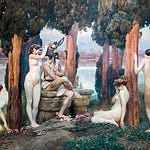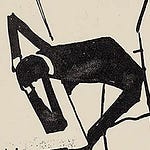Welcome back to The Invisible College, my series of literature courses for paid subscribers. The 2024 syllabus can be found here. This episode, of which the first 15 minutes are free, concerns F. Scott Fitzgerald’s The Great Gatsby. I discuss the novel’s ubiquity and whether or not it is overrated, as well as why this is such a common contrarian opinion. I put the novel in the context of Fitzgerald’s influences from Keats to Conrad and Eliot and consider the cosmopolitanism of Fitzgerald and other American writers before the Cold War institutionalization of the 19th-century American canon. I rehearse Fitzgerald’s glamorous and tragic biography. Turning to The Great Gatsby, I elaborate on its sophisticated narrative technique and its inner quarrel between Romantic idealism and modernist irony. I trace themes of the modernist waste land; modernity, urbanity, and self-fashioning; ideologies of race, ethnicity, gender, and sexuality; the automobile as symbol of care and carelessness; the moral reliability of the novel’s narrator; conflicts between the Old World and the New and between the west and the east in New World; and the relation of aesthetic form and the beauty of wealth to money itself as an abstract medium for exchanging values. Please like, share, comment, and enjoy!—and please offer a paid subscription so you don’t miss the rest of the American literature sequence, including forthcoming episodes on Ezra Pound, Wallace Stevens, and William Faulkner, not to mention the archive of episodes on modern British literature from Blake to Beckett and our previous sequences on the works of Joyce, including Ulysses, and on George Eliot’s Middlemarch, and whatever is forthcoming in 2025. The slideshow corresponding to the lecture can be downloaded below the paywall:
Listen to this episode with a 7-day free trial
Subscribe to Grand Hotel Abyss to listen to this post and get 7 days of free access to the full post archives.












